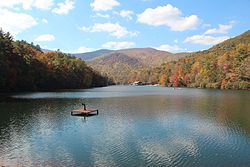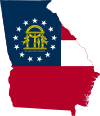Portal:Georgia (U.S. state)
The Georgia (U.S. state) PortalGeorgia /ˈdʒɔːrdʒə/ is a state located in the southeastern United States. It was established in 1732, the last of the original Thirteen Colonies. Named after King George II of Great Britain, Georgia was the fourth state to ratify the United States Constitution, on January 2, 1788. It declared its secession from the Union on January 21, 1861, and was one of the original seven Confederate states. It was the last state to be restored to the Union, on July 15, 1870. Georgia is the 24th most extensive and the 8th most populous of the 50 United States. From 2007 to 2008, 14 of Georgia's counties ranked among the nation's 100 fastest-growing, second only to Texas. Georgia is known as the Peach State and the Empire State of the South. Atlanta is the state's capital and its most populous city. Georgia is bordered on the south by Florida; on the east by the Atlantic Ocean and South Carolina; on the west by Alabama; and on the north by Tennessee and North Carolina. The northern part of the state is in the Blue Ridge Mountains, a mountain range in the vast Appalachian Mountains system. The central piedmont extends from the foothills to the fall line, where the rivers cascade down in elevation to the continental coastal plain of the southern part of the state. The highest point in Georgia is Brasstown Bald, 4,784 feet (1,458 m); the lowest point is the Atlantic Ocean. Georgia is the most extensive state east of the Mississippi River in terms of land area, although it is the fourth most extensive (after Michigan, Florida, and Wisconsin) in total area, a term which includes expanses of water which are part of state territory.
Selected article -In December 1946, Eugene Talmadge, the governor-elect of Georgia, died. The state constitution did not specify who would assume the governorship in such a situation. The situation became known as the Three Governors controversy. There were three men who made claims to the governorship:
The state's highest court, the Supreme Court of Georgia, ruled in March 1947 that the legislature had violated the state constitution by electing Herman Talmadge governor and that Lt. Governor Melvin E. Thompson should serve as governor until the next general election in November 1948. The court directed that in November 1948 there would be a special election at which voters would choose someone to complete Eugene Talmadage's term. Herman Talmadge immediately gave in to the court decision, ending the controversy. He ran for governor in 1948, overwhelmingly defeating Governor Thompson for the Democratic nomination and then easily winning the November special election. He served the final 26 months of the term for which his father had been elected. Selected picture - Credit: Thomson200
Vogel State Park is a 233-acre (0.94 km2) or 94 hectares state park located at the base of Blood Mountain in the Chattahoochee National Forest. It became one of the first two parks in Georgia when it founded a state park system in 1931. Much of the park was constructed by the Civilian Conservation Corps during the 1930s. State facts
State symbols:
Selected biography -Jackie Robinson (1919–1972) was the first African-American Major League Baseball (MLB) player of the modern era. Robinson broke the baseball color line when he debuted with the Brooklyn Dodgers in 1947. As the first black man to openly play in the major leagues since the 1880s, he was instrumental in bringing an end to racial segregation in professional baseball, which had relegated African-Americans to the Negro leagues for six decades. The example of his character and unquestionable talent challenged the traditional basis of segregation, which then marked many other aspects of American life, and contributed significantly to the Civil Rights Movement. Apart from his cultural impact, Robinson had an exceptional baseball career. Over ten seasons, he played in six World Series and contributed to the Dodgers' 1955 World Championship. He was selected for six consecutive All-Star Games from 1949 to 1954, was the recipient of the inaugural MLB Rookie of the Year Award in 1947, and won the National League Most Valuable Player Award in 1949 – the first black player so honored. Robinson was inducted into the Baseball Hall of Fame in 1962. In 1997, Major League Baseball retired his uniform number, 42, across all major league teams. In recognition of his achievements on and off the field, Robinson was posthumously awarded the Presidential Medal of Freedom and the Congressional Gold Medal. Selected anniversaries for September
Did you know -
CategoriesSelect [►] to view subcategories
WikiProjects
What are WikiProjects? Selected panoramaCredit: Ebyabe
The Lapham-Patterson House is a historic site in Thomasville, Georgia. The house, built between 1884-85 as a winter cottage for businessman C.W. Lapham of Chicago, is a significant example of Victorian architecture. It has a number of architectural details, such as fishscale shingles, an intricately designed porch, long-leaf pine inlaid floors, and a double-flue chimney. Inside, the house was well-appointed with a gas lighting system, hot and cold running water, indoor plumbing, and modern closets. Its most significant feature is its completely intentional lack of symmetry. None of the windows, doors, or closets are square. The house is a Georgia Historic Site and is also a National Historic Landmark, which also puts it on the National Register of Historic Places. Selected quoteQuality content
Featured articlesFeatured lists
A-Class articlesFeatured pictures
TopicsThings you can doedit · history · watch · purge Related portalsAssociated WikimediaThe following Wikimedia Foundation sister projects provide more on this subject:
Discover Wikipedia using portals |






























